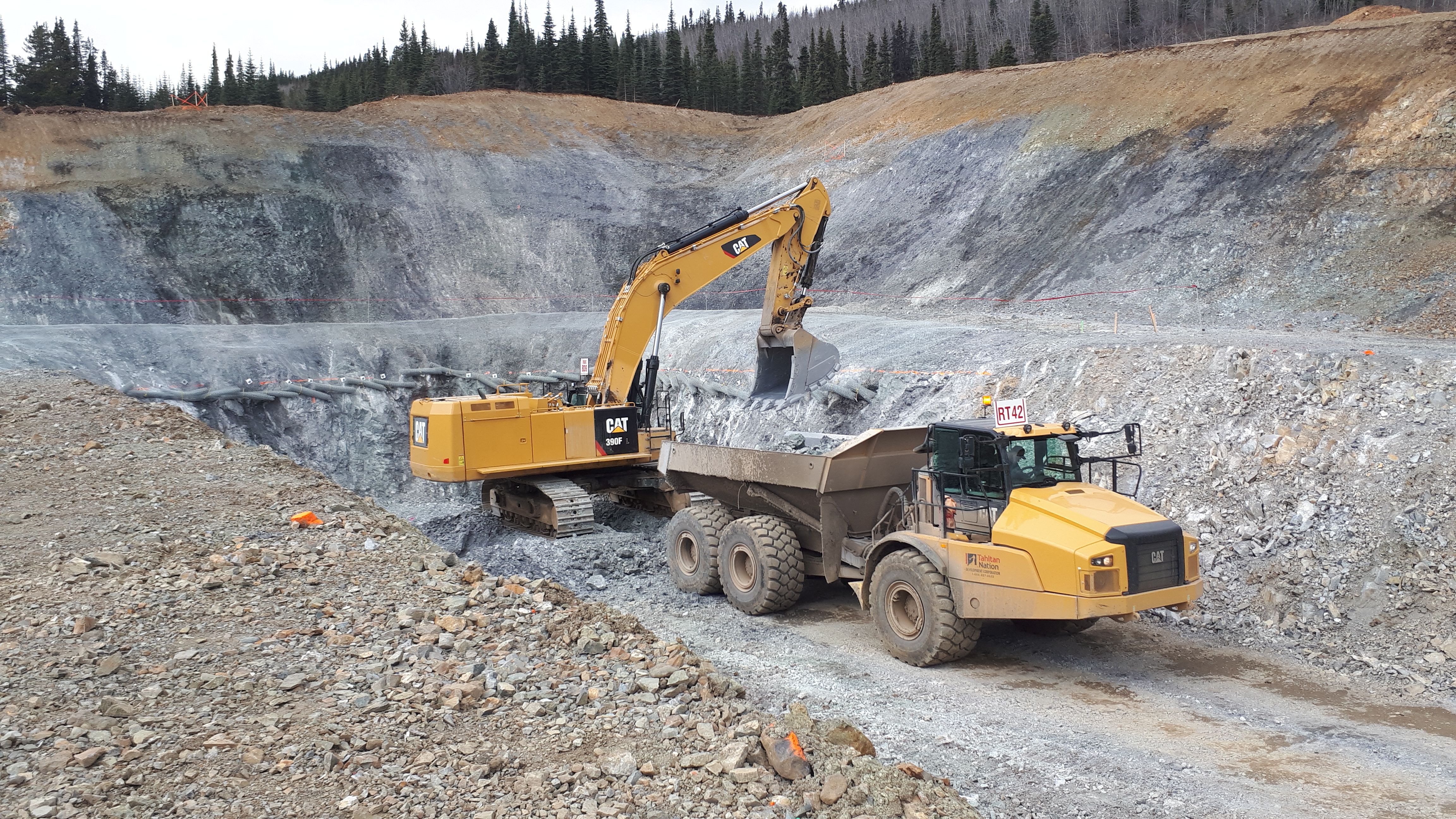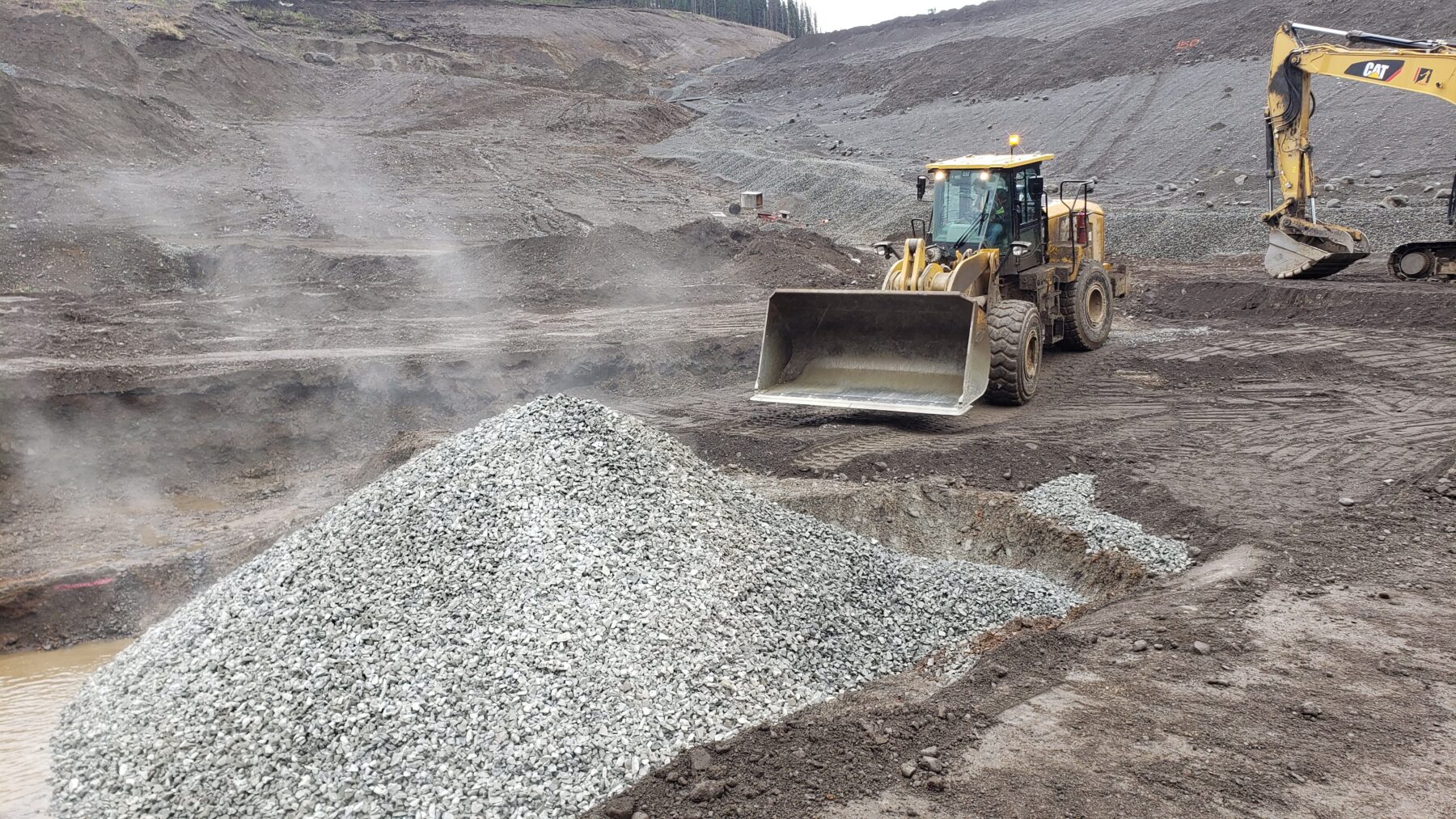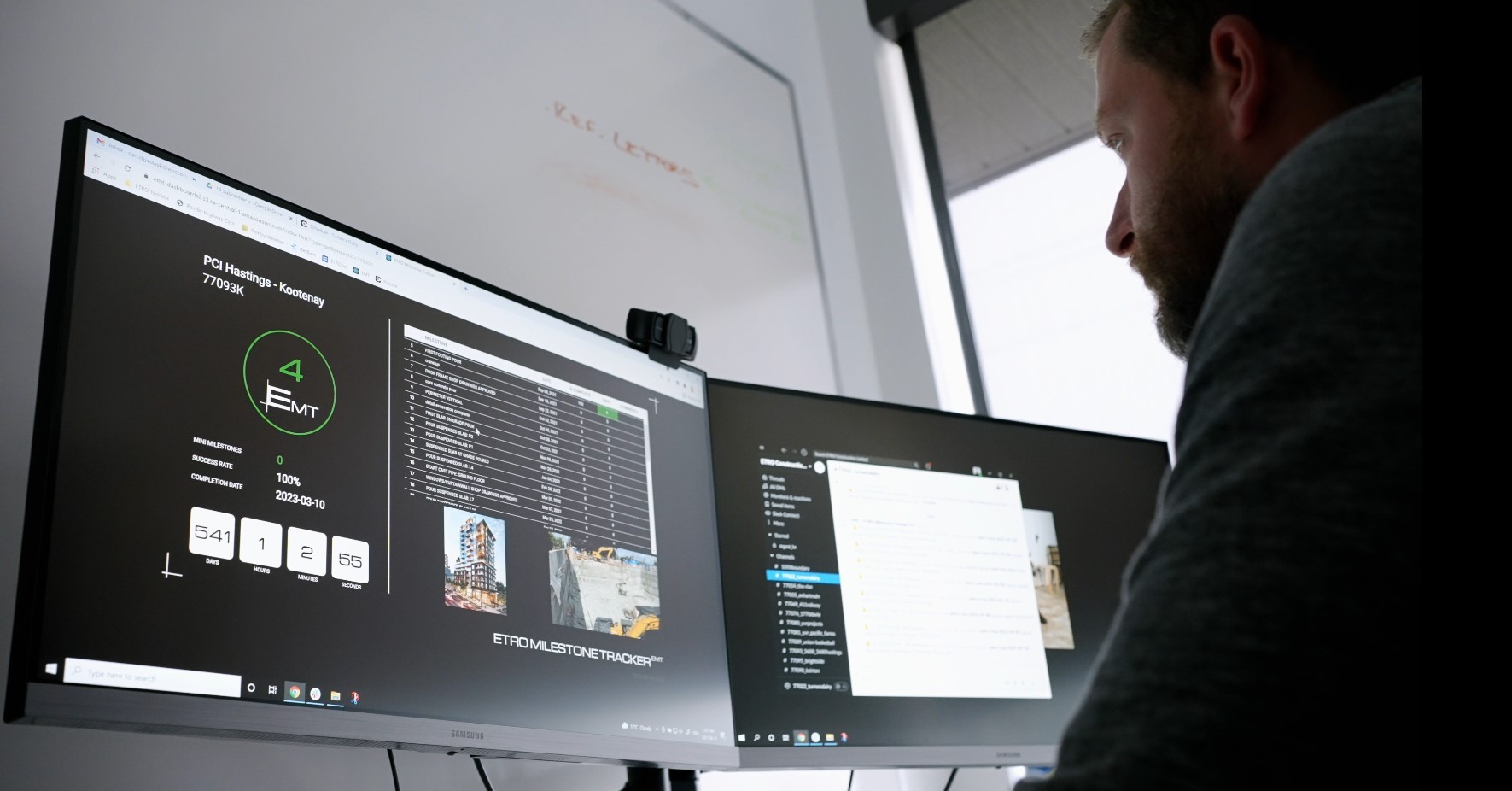These Western companies are a masterclass in growth
Despite the myriad of challenges the industry has faced, these companies are rising to the top.

What does it take to grow a company from nothing into something in today’s competitive construction market?
These three companies have it in spades. SiteNews sat down with leaders from ETRO Construction, Tahltan Nation Development Corporation, and Inferno Solar to see what their keys to success are and what their journeys have been like.
Inferno Solar
Inferno Solar president Curtis Craig was green from the start.
He was raised in Alberta with an appreciation for the land, visiting grandparent’s farm every week. They grew just about everything that would in the prairies: peas, carrots, potatoes, dill, strawberries and more.
“One thing my grandpa did that always stuck with me, is that he was a steward of the land,” Craig said. “There was land he farmed and land he voluntarily set aside for recreation so people in the community could use it for free. Those things were important in shaping who I am and what I value and gave me an appreciation for the environment.”
After high school, Craig’s father got him a job sweeping floors and doing general labour on construction sites.
“It clicked for me and I progressed rapidly in that role to being a siding installer by the end of the summer,” said Craig. “It felt like a big change for me. I had found something I liked and I was good at.”
Craig was soon able to line up an electrician apprenticeship, which he enjoyed even more. His hard work and aptitude propelled him forward and at 21 he had apprentices of his own that were decades older. When Craig began to plan his next career move, a carpenter and civil engineer steered him towards engineering. He applied to the University of Calgary and was accepted.
“It was not a really enjoyable time. It was a really difficult program and a pretty hellish time but after coming out, I realized he had been right,” he said.
After school he worked for an electrical consulting company. While doing his day job he always kept his eye out for other opportunities on the side to get experience. He got into designing solar systems for schools and became a subject matter expert at the firm.
“I dove in wholeheartedly and did a pack of three schools with solar on them,” he said. “I also had set up a corporation to do consulting or start my own business. A family friend had presented an opportunity to put solar on a Telus project but I would likely have to quit my day job or work evenings and weekends. I felt that I couldn’t advance as quickly as I would like at the engineering firm.”
So Craig went for it and quit his job.
“I thought ‘to hell with it’,” he said. “Renewable energy, generating power, living a sustainable life, leaving the planet better than I found it – it was a cool opportunity. I quit my job, got my business license.”
The move has since grown into Inferno Solar, a turn-key approach to solar systems that includes everything from project management, design, and engineering, to procurement, construction, and installation.
“It has stretched me personally and professionally and I have grown in ways I never expected,” said Craig. “It’s exciting and we are starting to see the fruits of our labour.”
He explained that while Inferno has focused on rooftops, the solar sector, more broadly, is taking off right now with ground mounted work. This is because that is where the energy is needed at the end of the day, without the need for additional transmission infrastructure, and it’s where Inferno’s expertise is as commercial electricians and commercial electrical engineers.

“Plus it looks terrific and lowers operating costs,” he said, adding that Alberta also has an open mind when it comes to power. “Anybody that wants to generate power can do so. We are ground zero for power purchase agreements for companies that want renewable energy because, as far as I know, we are the only jurisdiction that allows these big deals.”
Labatt Brewing, for example, is procuring all their electricity through clean energy. RBC, Amazon, Microsoft and Telus all have power purchase agreements for solar.
Craig added that there is also very favourable legislation around generators large enough to match loads on these sites. Crews can build up to 5,000 kilowatts of solar on a site.
“While B.C. allows you to do this, you can’t export,” he said. “Saskatchewan is similar and they have less red tape to do larger scale solar projects. Saskatchewan is very limited in their appetite for rooftop solar and as very restrictive on what can be installed, and protective of their market.”
Craig noted that this reduction in red tape has resulted in billions of dollars in solar investment in Alberta. To take advantage of this boom, Inferno has found its own niche.
“There are guys out there that do panels on top of piles in farmland to connect to a grid,” he said. “That’s good to a point. But what about getting energy where people need it? If I’m a company with 50 fleet vehicles and I want them all EV, why can’t I generate power right where I need it and charge my vehicles?”
Craig explained that this opens the door to Inferno’s third product, battery storage. He believes that the sector is close to a point where on-site solar and on-site EV charge and on-site battery storage will have such an economic benefit to a business that it would be foolish not to do it.
Last fall, Exro Technologies Inc., a clean technology company that has developed new generation power control electronics, announced a strategic development and distribution agreement with Inferno. They plan to work together to bring economical battery storage to Western Canada.
Craig believes a major part of Inferno’s success has been its people, speed and expertise.
“We have some great people and all of us are aligned on values and mission,” he said. “Our values are do what you say, stand by your word, give a price and know the scope. We say that we are the experts so the price shouldn’t change. Not once have we asked for a change order on a solar contract.”
Tahltan Nation
Tahltan Nation Development Corporation (TNDC) was founded in 1985 by Tahltan Nation leaders to be the business arm of their community. The Nation wanted to ensure the Tahltan Nation benefits from the economic activities and development occurring within Tahltan Territory and to provide employment, training, and contracting opportunities to Tahltan members.
Today it is one of the biggest Indigenous businesses in B.C.
Early on, major mining projects helped propel it forward. Between 1990 and 2008, TNDC and its JV partners secured more than $200 million in contracts at the Eskay Mine with Homestake Mining, North American Metals, and Barrick Gold. Between 2007 and 2009, TNDC established additional joint ventures to secure contracts on Novagold’s Galore Creek project and provide employment opportunities for Tahltans.
From its roots in residential construction, TNDC’s services have expanded to heavy construction, earthworks, camp services, air support, aviation, forestry, transportation, and fibre-optic communications services. To achieve this expansion, TNDC has partnered with more than 20 industry leaders.
“This enables us to combine our respective strengths and capabilities, benefitting TNDC, our partners and our clients,” said corporation officials. “With each achievement, TNDC and our employees gained experience, grew our reputation, and built our equipment fleet.”
In recent years, new TNDC ventures like the Airport Services division, the Fibre Optics Division and Forestry Division, are providing new revenue streams as well as year-round employment and emerging career opportunities for local Tahltans. While TNDC continues to diversify its business, exploration and mining remain the primary industry it serves, and heavy construction and camp services are its core operations.

Recently, TNDC and its partners have been helping to advance Seabridge Gold’s KSM Project and Skeena Resources’ Eskay Creek Revitalization Project. Its largest client is Newcrest Mining Limited, which operates the Brucejack and Red Chris mines. At the Brucejack Mine, TNDC is delivering underground tunnel development, ground support and production services.
Together with its partners, the scope of services TNDC is providing at Red Chris includes crew transportation by air charter and highway coach, camp services, tailings impoundment area construction, underground mining portal exploration, underground explosives, geotechnical and exploration drilling, and concentrate hauling.
In 2021, TNDC began operating the Dease Lake Airport, responsible for inspections, maintenance, and ongoing operations. TNDC is serving mining charter and medevac flights, providing air freight bulk diesel sales to exploration companies, and established a heli-base to operators needing local logistical help.
As the business arm of the Tahltan Nation, TNDC is owned by its shareholders – Iskut Band, Tahltan Band, and Tahltan Central Government. A portion of profits are returned to the shareholders through annual dividends for initiatives to benefit Tahltan members.
TNDC also provides community donations, hosts an annual Christmas Party, and provides equipment services in-kind. The other significant contribution is employment and training opportunities for Tahltan members and Tahltan-owned businesses.
Going forward, TNDC said it wants to focus on people, partners and clients.
“We are implementing strategies to attract, retain and develop the talent we need and investing in our people through training, development and mentorship, helping our employees grow their careers, and into leadership roles,” said officials.
A key goal in 2023 is achieving WorkSafe BC Certificate of Recognition (COR), a voluntary and coveted benchmark of corporate health and safety excellence.
Another key goal is to be the Indigenous partner of choice to clients and business partners. The company explained that working with tier 1 mining companies requires TNDC to have tier 1 practices, processes and governance across every area of the business.
Collaboration will continue to be an important strategy to help drive TNDC’s growth.
“TNDC’s goal is to be an integrated full-service provider and trusted partner to clients,” said officials. “TNDC brings value to our clients with local knowledge, operations, personnel, and equipment. But to secure new contract opportunities and expand our capabilities, we have partnered with several providers who are leaders in their sectors.”
One area of opportunity in mining is the implementation of advanced technologies like equipment automation, digital tools, and battery powered equipment in operations. TNDC’s new partnership with Swedish multinational engineering company Sandvik will be at the forefront of bringing these innovations to the sector.
“TNDC’s future is incredibly bright. TNDC is on a transitional journey from a small community-owned business into a sophisticated powerhouse Indigenous business that is charting a new course to long-term growth, prosperity and new opportunities for the Tahltan Nation,” said Carol Danielson, chair of its board of directors. “TNDC has the right leadership and strategy in place to ensure its long-term sustainability for generations to come. Working together as one team and in collaboration with our clients, partners, employees and shareholders, TNDC will achieve its goal to be the Indigenous Business Partner of Choice.”
ETRO Construction
When Mike Maierle started at Ledcor as a junior estimator he was just 19 years old.
He worked his way up in the Vancouver office and moved to the Bahamas to run a major airport project for the company.
His time there was a turning point that sent his career in a completely different direction.
“Down there I got a case for being independent,” he said. “I was left alone in some ways with a lot of autonomy. It opened my eyes to maybe trying something on my own.”
He got home and reacquainted himself with the Vancouver market for several years as director of pre-construction. Opportunities were ahead of him.
“My career was whatever I wanted it to be, maybe even president, but that didn’t interest me,” he said. “It meant taking over a cruise line versus starting my own little ship that could be more dynamic. Ledcor is an amazing company but it was changing from the company I started at. I wanted a small, dynamic organization that could change quickly without navigating the corporate world.”
On Canada Day in 2015 he woke up and put in his notice, shocking the company. 90 days later, he was starting ETRO in his basement doing one small project with his friends.
“For the first few months I delivered lumber, I was site superintendent, the accounting clerk – I wore all hats,” he said. “I got on the phone and started to see who had opportunities and as those opportunities came my way, we slowly started to build out the team.”
One of ETRO’s earliest employees was director of construction Dan Chyzowski who spent time with Maierle working on Ledcor’s airport project in the Bahamas.
“When Mike started it was really under this vision of building stuff differently with a focus and foundation of people, leveraging technology, and automating what you can so we can focus on building relationships,” said Chyzowski. “We’re tired of saying ‘this is how we have always done it’ and we are focused on finding newer, better, more sustainable ways to build projects and building a team of like-minded people. I think that’s really at the foundation of growth.”
The next year, ETRO had eight employees and enough small projects to get things rolling. This freed up Maierle to focusing on growing the businesses and developing its own way of doing things. He had to prove to the industry that his success in the past wasn’t just because he was at a large, sophisticated company. This meant going from doing billion dollar projects to one’s well under a million dollars.
And early on, Maierle wanted to make sure the small company could implement structures and processes that would contribute to employee success.
Each new project proved themselves a little more and led to more projects. Their first few residential projects led to a large credit union project north of $50 million with PCI. This led to a major retrofit in English Bay and then the complex 411 Railway project. They also were tapped to do a series of challenging specialty projects at Parq Vancouver which earned ETRO a Gold Award from the Vancouver Regional Construction Association (VRCA).
“So many projects led to the next one and today we are in a position where we have dozens of projects in front of us,” said Maierle. “We have the trust of the market and compete with the big guys now.”
ETRO has almost 100 people, $350 million in work underway and more than $300 million in backlog.
“We have gone from using a folding table at work to one of the top general contractors in Vancouver,” he said.
A major part of this growth has been forging strong relationships with owners, partners and trade partners. Maierle added that ETRO’s story and culture has also contributed, attracting talent. He praised ETRO’s pre-construction and planning department, which is so good that clients will pay more for it.
“We are very open and transparent about our story, showing people what we are up to and talking about it,” said Maierle.

And he believes the company is only partially done evolving.
“We are evaluating every aspect of our business and how it can be exceptional. There is no status quo. There is no process that isn’t evaluated regularly.”
To stay on top of projects, ETRO created its own application for milestone tracking. It features a dashboard that identifies where projects are in the schedule and if they are falling behind. This dashboard is displayed prominently in the office for transparency and so issues can be found early. It was so successful it earned them a Groundbreaker awards from Procore Technologies.
“It’s all about simplification,” explained ETRO’s strategic initiatives manager Karina Delcourt. “ETRO has an enormous amount of data.”
She has a myriad of projects underway to streamline systems and connect the team.
“We need to reduce the amount of work we do to get a project done, so can we simplify meetings or the time needed to produce reports by automating it? That’s what we are looking at. We need to grow and scale but there’s a labour shortage so we can’t just hire everyone. So we have to do more with less people.”
The strategy going forward is to execute projects with discipline, attract incredible talent and look at better ways to build.
“Whatever projects others think are too hard or challenging, let’s focus on being the builder of choice for those and focus on supporting our primary client base. We don’t have a business development department. We have amazing relationships that we nurture and treat well. This creates a good pipeline and as we have grown they have allowed us to take on larger projects in that pipeline.”

